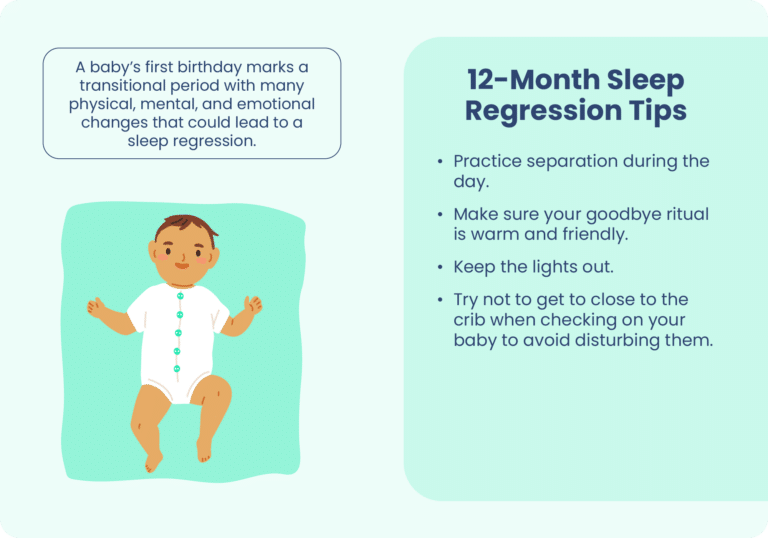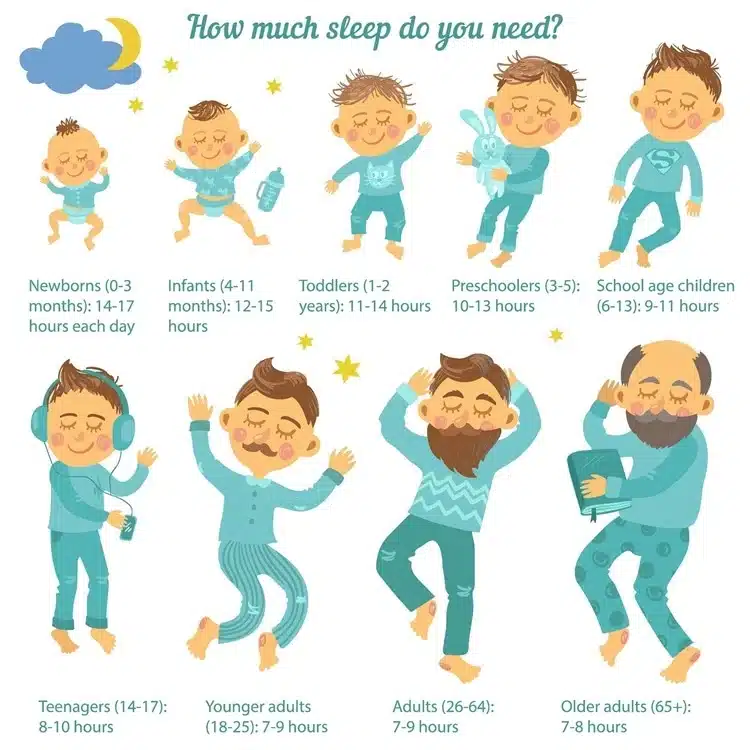Sleep regression a term that strikes fear into the hearts of even the most seasoned parents. One moment, your little one is sleeping peacefully through the night, and the next, you’re dealing with midnight wake-ups, nap refusals, and a cranky baby (and let’s face it, cranky parents too).
If you’re navigating this frustrating phase, don’t worry, you’re not alone. Sleep regression is a normal part of your child’s development, even if it doesn’t feel normal at 3 a.m. In this comprehensive guide, we’ll explore what sleep regression is, why it happens, and most importantly, how to manage it while keeping your sanity intact.
What Is Sleep Regression?

Sleep regression is when a baby or toddler suddenly starts waking up more often at night, resisting naps, or refusing to fall asleep even if they’ve previously been great sleepers. It’s not a medical condition but rather a developmental phase.
Think of it as your baby’s brain working overtime. As your little one grows and hits new milestones, their sleep patterns can temporarily take a hit. While it’s exhausting, it’s also a sign that your baby is developing new skills and adapting to the world around them.
Why Does Sleep Regression Happen?
Sleep regression can be caused by several factors, often working together. Let’s break down the common culprits:
1. Developmental Milestones
Babies are busy little learners. Rolling over, sitting up, crawling, and walking are all exciting achievements, but they can also disrupt sleep. Your baby might be so eager to practice their new skills that they wake up ready to “play.”
2. Growth Spurts
Rapid growth means increased hunger. During growth spurts, your baby may wake up more often at night to refuel.
3. Teething
Teething pain can make it harder for babies to settle down and stay asleep.
4. Separation Anxiety
Around 8–12 months, babies develop a stronger attachment to their caregivers and may wake up looking for reassurance.
5. Routine Disruptions
Travel, illness, starting daycare, or even a time change can throw off your baby’s sleep schedule.
When Does Sleep Regression Happen?

Sleep regressions typically occur around specific ages, often coinciding with developmental milestones.
| Age | What’s Happening? |
|---|---|
| 4 months | Sleep cycles mature, and babies experience more light sleep phases. |
| 6 months | Growth spurts and teething can cause night wakings. |
| 8–10 months | Crawling, standing, and separation anxiety peak during this time. |
| 12 months | Many babies start walking and may drop a nap, affecting sleep patterns. |
| 18 months | Toddler tantrums, teething, and nightmares can disrupt sleep. |
| 2 years | Potty training, bedtime resistance, and newfound independence emerge. |
Signs of Sleep Regression
Not sure if your baby is experiencing sleep regression? Look out for these signs:
- Frequent Night Wakings: Your baby wakes up multiple times during the night, often crying.
- Nap Resistance: Your little one suddenly refuses to nap or takes shorter naps.
- Fussiness or Crankiness: Increased irritability during the day due to poor sleep.
- Difficulty Falling Asleep: Your baby struggles to settle at bedtime or takes much longer than usual to fall asleep.
How Long Does Sleep Regression Last?
The good news is that sleep regressions are temporary. Most last between 2 to 6 weeks, though the exact duration depends on the underlying cause. For example, a regression caused by teething may improve once the teeth come through, while developmental milestones may take a bit longer to adjust to.
How to Manage Sleep Regression
Handling sleep regression requires a mix of patience, consistency, and some strategic adjustments. Here are practical tips to help you manage:
1. Stick to a Bedtime Routine
A consistent bedtime routine helps signal to your baby that it’s time to wind down. Your routine might include:
- A warm bath
- Reading a favorite book
- Singing a lullaby
- Cuddles and quiet time
By repeating the same steps in the same order each night, you create a sense of security and predictability for your baby.
2. Watch for Sleep Cues
Babies often show signs of tiredness before they become overtired. Look for cues like:
- Yawning
- Rubbing their eyes
- Turning away from stimulation
Put your baby to bed at the first signs of sleepiness to make it easier for them to fall asleep.
3. Encourage Self-Soothing
Teaching your baby to fall asleep independently can make a big difference. Put your baby down when they’re drowsy but still awake. This helps them learn to self-soothe if they wake up during the night.
4. Create a Sleep-Friendly Environment
Make the sleep environment as comfortable and distraction-free as possible:
- Use blackout curtains to block light.
- Turn on a white noise machine to drown out background noise.
- Keep the room at a comfortable temperature.
5. Handle Night Wakings Gently
When your baby wakes up, give them a few minutes to settle on their own before responding. If you do need to check on them:
- Keep the lights dim.
- Avoid talking or stimulating activities.
- Offer a gentle pat or soothing words, but try not to pick them up unless necessary.
6. Adjust Nap Schedules
If your baby is resisting naps or waking up too early, it may be time to tweak their nap schedule. For example:
- Shorten morning naps to encourage longer afternoon naps.
- Move bedtime earlier if naps are consistently short.
7. Offer Extra Comfort During the Day
If separation anxiety is the issue, spend extra time cuddling and playing during the day. This can help your baby feel secure and less anxious at night.
8. Be Patient and Consistent
Consistency is key. Stick to your routines and sleep guidelines even when it feels like nothing is working. Babies thrive on predictability, and over time, your efforts will pay off.
Can You Prevent Sleep Regression?
Unfortunately, sleep regression is a natural part of a baby’s development, so it can’t be fully prevented. However, establishing good sleep habits early on can make regressions easier to manage:
- Stick to consistent routines.
- Encourage independent sleep habits.
- Make adjustments gradually when transitioning routines.
How to Cope as a Parent
Sleep regressions don’t just affect babies, they’re tough on parents too. Here are some tips to help you get through it:
- Nap When Baby Naps: Even short naps can help you recharge.
- Divide and Conquer: Share night duties with your partner or a trusted family member.
- Ask for Help: Don’t hesitate to lean on your support system.
- Take Care of Yourself: Eat well, stay hydrated, and take breaks when you can.
- Remind Yourself It’s Temporary: Sleep regressions are frustrating but short-lived.
When to Call a Doctor
While most sleep regressions resolve on their own, you should consult your pediatrician if:
- Sleep disruptions last longer than 6 weeks.
- Your baby seems unusually irritable or unwell.
- You notice signs of a health issue, such as persistent fever or trouble breathing.
Key Takeaways
- Sleep regression is a temporary phase where babies experience disrupted sleep due to growth, developmental milestones, or routine changes.
- It often occurs at predictable ages, such as 4, 6, 8–10, 12, 18, and 24 months.
- Stick to consistent routines, encourage self-soothing, and create a calming sleep environment to manage sleep regressions.
- Be patient, take care of yourself, and remember that this phase will pass.
Parenting is hard work, especially during sleep regressions. But with a little patience and a lot of love, you’ll get through it and so will your baby. Sweet dreams (eventually).
References
- National Sleep Foundation – Understanding Baby Sleep
- Mayo Clinic – Infant Sleep Patterns
- American Academy of Pediatrics – Sleep Training and Healthy Habits
- Centers for Disease Control and Prevention – Infant Development Milestones
- MedlinePlus – Tips for Dealing with Baby Sleep Problems


